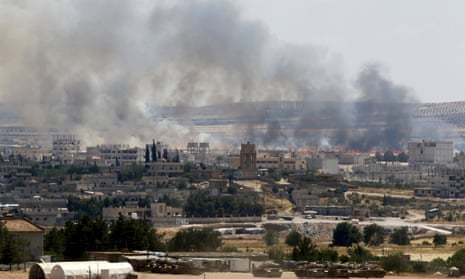Kurdish forces are closing in on Islamic State fighters in the town of Kobani in Syria, after the militants slaughtered at least 154 people in one of their biggest massacres aof civilians in the country’s civil war.
A Kurdish spokesman told the Guardian that the militants were pinned in three locations in the embattled town near the Turkish border, including a field hospital. More than 100 hostages are being held by Isis fighters or are trapped due to the crossfire.
The spokesman said intermittent clashes were ongoing but the militants were completely surrounded.
“Daesh (Isis) is carrying out a collective suicide attack, not to control Kobani or occupy it, but to kill the largest possible number of civilians,” said Redur Xelil, the spokesman of the People’s Protection Units (YPG), the main Syrian Kurdish militia.
Xelil said the number of people killed, which includes many women and children, is likely to rise as some of the dead are inside buildings inaccessible to the YPG.
Isis fighters in five vehicles entered Kobani under cover of darkness in the early hours of Thursday disguised as allied militiamen, before opening fire at random in the city and detonating a car bomb at a border crossing. The terror group lost over a thousand fighters last year in an ill-fated assault on the town, an enclave on the Turkish border that emerged as a potent symbol of Kurdish defiance against Isis.
An alliance of the YPG and Syrian opposition fighters backed by airstrikes by the US-led coalition against the militant group has seized swaths of territory from Isis in recent days, including the strategic border town of Tal Abyad, a key lifeline of foreign fighters and supplies for the militants. Isis has also surrendered a military base once held by Bashar al-Assad’s regime and the town of Ain Issa, bringing the Kurds and their allies within 30 miles of Raqqa, the capital of Islamic State’s self-declared caliphate.
Monitoring groups say Isis is retrenching in Raqqa, its seat of power in Syria, bringing in reinforcements and military vehicles. The suicide attack on Kobane, which does not seriously threaten their hold on the town, appears aimed primarily to sow terror, raise the morale of its fighters and draw Kurdish forces away from the frontlines.
Kurdish forces are also overstretched, struggling to provide adequate protection to areas liberated from Isis.
“I assume that the main purpose of the attack was almost certainly not to take and hold Kobane, but to throw the Kurds off balance and force them to divert forces to protect Kobane and other rear areas, so as to ease the threat they pose to Isis’s ‘capital’ in Raqqa,” said Yezid Sayegh, an expert at the Carnegie Middle East Centre in Beirut.
“Consequently, Isis didn’t need to use large numbers of fighters, just enough to do something dramatic – easily done by attacking a ‘soft’ target such as civilians.”
The Kurds have emerged as one of the few success stories in the coalition’s strategy to contain Isis, advancing and holding territory in the fight against the terror group. But it has also exposed the limits of the strategy, with the coalition’s refusal to arm the Kurds and provide them with war materiel that could give them the edge against Isis, flush with American munitions, vehicles and supplies seized from the Iraqi army in their conquests across the border.
Xelil, the YPG spokesman, said the Kurds were working to improve security in the territories conquered from Isis. But he called on the coalition against Isis and the international community to provide the Kurds fighting the militants on the ground with weapons and equipment, saying they had not “provided a single bullet or rifle to the YPG”.
